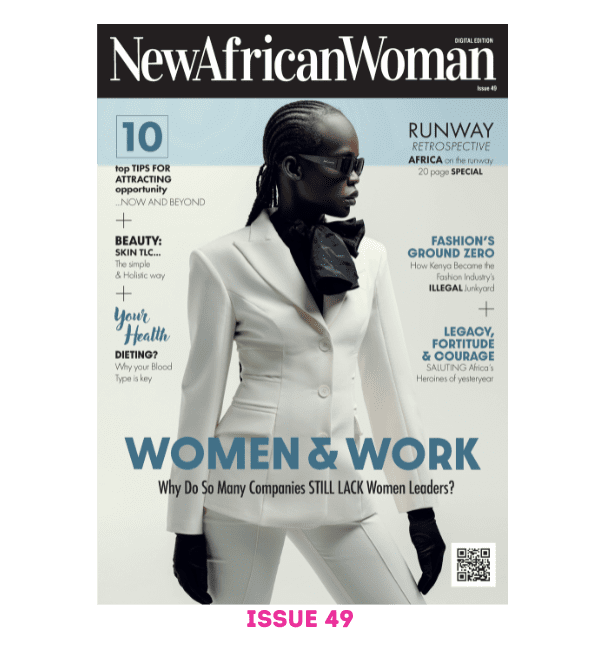Adieu Wondrous Zahara (1987-2023): “I wanted people to be happy when listening to my music.”

In the words of her family: “She was a pure light, and an even purer heart, in this world. A beacon of hope, a gift, and a blessing to us and countless people around the world. A legendary figure in the world of music, Zahara remarkably touched millions of people’s lives with her extraordinary gift and passion for music. She leaves behind an indelible mark on the music industry and a legacy that will forever resonate in our hearts and souls. A life so beautifully lived deserves to be beautifully remembered…”
Back in 2012, we had the honour of featuring Zahara on the South African Cover of New African Woman Issue 15. She was only 24, and an exciting sensation following the release of her globally successful Loliwe. Deservedly so. As we mourn her passing, we revisit the interview with mixed feelings of love and grief. Her rare talent is indeed incomparable. There was only one Zahara.

We republish the full interview below:
She is a simple girl from a small village in Eastern Cape, but with her sensational debut album, she has already attained the rare status of having a one-word moniker as her name – Zahara! Her whirlwind rise to fame has seen the 24-year-old music genius, who grew up with little, bag eight South African Music Awards and sing privately for Nelson Mandela at his home. Zahara (born Bulelwa Mkutukana) shares with New African Woman the highs and lows of her phenomenal rise and becoming a household name. “If a young girl from a small village can make it, anyone can,” she tells our Masanda Peter in this special interview.
New African Woman: There is unprecedented exhilaration around the name Zahara. Has it all sunk in?
Zahara: Everything happened so fast for me. I have not even had time to sit back and take in all that is happening with my music and my life.
How did you get into the music industry?
My father bought my sister a guitar as she was studying the arts, but she was not using it. One day I decided to play and was hitting the right notes, playing it with no formal training, all that you see is self-taught.
What kind of a home do you come from?
I come from a family of six children and am the fifth born, and there is my mother and father. We grew up in a village and were from a poor background where you would not even find proper flushing toilets. My mother is a domestic worker and my father used to work in a factory. We all lived in a two-roomed shack, and we had to fit in there. But that was our home. My father later saved some money to build a house but could only do that when he got his bonus, so it took him five years to complete the house. When I started getting money from my music, I managed to help him finish the house and put in furniture. But it’s been humble beginnings. I used to go to school with no shoes and sometimes would not eat. But in all of that, we were and still are a praying family. My parents instilled the fear and love of God in me. My mother used to tell me that our situation will be good one day.
Did you manage to finish school?
I studied for the first two years at a university, but the funds dried up and I had to drop out of school. At that time, I knew that I had passion in music and had joined poetry sessions, which kept me busy.
How did your big break come?
One day while performing at the poetry club, my now manager was also in attendance. At that time I was a favourite with the audience, and for two months I was a headline performer. On this particular day, and I performed Loliwe and My Guitar, and after my performance, he told me that he had a recording company and wanted me to be part of his company. I did not get excited because I had many people promising to record with me, but nothing had materialised. But I knew some of the artists under his stable, but I still thought he is one of those with empty promises. Three weeks later, he came back with his wife and with my parent’s blessing, they took me with them to Johannesburg. His wife is also a music artist and she featured me in her album and that was the start of my music career and
people started noticing me.
How has the journey been since then?
When the album (Loliwe) was released, within two hours it was sold out, in 13 days
It was platinum, in 17 days it was double platinum and in three months it had sold over 200,000 units. And soon, I was invited to New York by Michael Rosenblatt, the man who discovered Madonna. It was my first trip overseas, but I really started getting noticed.
Tell me about your first solo performance? How was that experience?
I will never forget that day, it was after my album was released. The feedback was overwhelming and there were about 35,000 people at a stadium waiting for me to perform. I was crying throughout the set. Seeing so many people, who were singing along too. I then went to sing in my hometown in front of my parents, that was crazy and humbled me. I kept asking myself what I had done for all of these good things to be happening to me.
Then you sang for Nelson Mandela, how was that experience for you?
I was so excited and even messed up my verses. It was such an emotional moment. I had never seen the great man in person before. Can you imagine that the first time I see him, I am singing for him in his house? It was a humbling experience, and I was shaking. And when I finished the last song, he clapped and said I was a special child. He asked me for a guitar, I thought he was joking, and his office later called asking me for the guitar he had asked for. I am planning to deliver it to him very soon. That was such a huge moment for me, and it was such a blessing, it is a moment I will never forget.
What would you say have been some of the challenges of your new-found fame so far?
A few months ago I was in the tabloids for things that were not true about me being exploited by my record company and that hurt me, but I do not want to focus on that. There are bigger and more exciting things that have happened in my life so far. I won eight awards at the South African Music Awards. People should appreciate the fact that I have my own plan and I will always listen to my mother and want to remain humble.
Do you suddenly have new-found friends relatives now that you are at the height of your success?
Not really, fortunately for me I like to keep to myself and do not like crowds. Even as a child I mostly stayed indoors. My mother used to tell us that those you grew up with are
the best people one should stick with. Even after performing I go straight home afterwards. I have two close friends and that works for me.
How would you describe your music?
I’ve never had a plan with the album, I was just singing and loved writing, but I wanted people to be happy when listening to my music. The album (Loliwe) is about my life experiences. There is a song called Umthwalo Wam – that song is about the hardships I have experienced. I used to go to school with no shoes but the dreams I had, kept me going. There was no way that I was going to allow my hardships to hold me back. Another song that talks to me is Destiny. In my village there are many people who are using drugs and have given up on life, with nothing motivating them. I want people to know and see that they can reach their destiny no matter what their circumstances. I have always loved inspiring people.
What do you live by and what message do you have for those in challenging situations?
Never let go of your dreams. If I had let go of my dreams I would not be where I am today. Your time will come, hang in there. We sometimes want things now but we need to be patient, when it is your time no one can take that away from you. My motto is “stand for something or you will fall for anything”. I am a born-again and I love God. I want to praise God with everything that I do in my life. For all that I have achieved, it is all because of my God. He has taken me this far and I know that.
Which artists have inspired you?
My mother used to listen to Miriam Makeba and I would have loved to perform with her.I was also inspired by the late pop sensation Brenda Fassie who was real and brought originality into the music industry, which is what I am planning to bring. My biggest dream is to perform with the legendary Tracy Chapman. If she can even be around when I sing, that would make my day. I am praying that one day this dream comes true.
What do your parents think of your success?
The first time my mother saw me singing on television she cried, she was unable to talk to me over the phone. Every time she sees me performing she cries as she cannot believe that her daughter has achieved so much in such a short space of time. My hometown has become a tourist place, people want to see the home I grew up in. My community is also very proud of me and they are proud of the fact that I have put the place on the map. I have inspired other children because if I can make it so can they. I want to give hope to other kids who are in the same situation as me.
What do you believe you are bringing to the music industry?
I have brought my originality. I want to be remembered as the girl who changed the world through her music. I do not want to be someone else or succumb to the pressures of the industry.
Have you treated yourself to something nice since you became famous?
I bought myself a house. That has been my biggest highlight so far, and it is also the first time that I will be staying on my own but I am excited. And I am buying my mum and dad a car very soon. I have also bought myself six guitars.
Any message for struggling African artists out there?
If a young girl from a village can make it, they can too. Do not let go of your dreams. Your time will surely come

At THE 2012 SOUTH AFRICAN MUSIC AWARDS NEWCOMER ZAHARA SENSATIONALLY TOOK HOME AWARDS FOR:
• Album of the Year
• Best Selling Album
• Best Smooth Urban Music Album
• Best Collaboration
• Newcomer of the Year
• Female Artist of the Year
• Best Selling Full-Track Download
• Remix of the Year, in collaboration with another artist.









